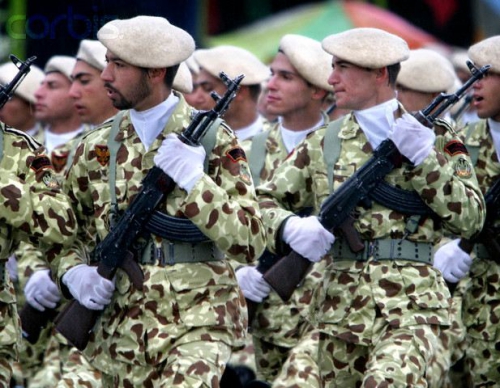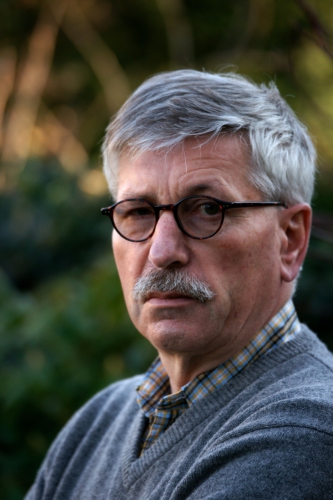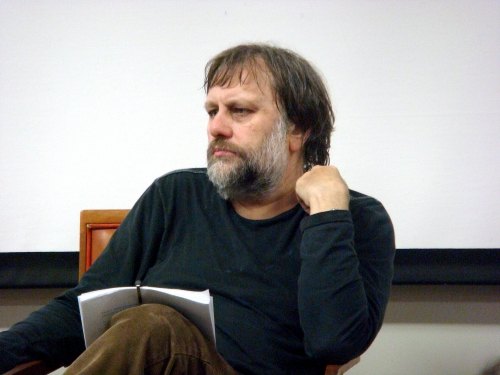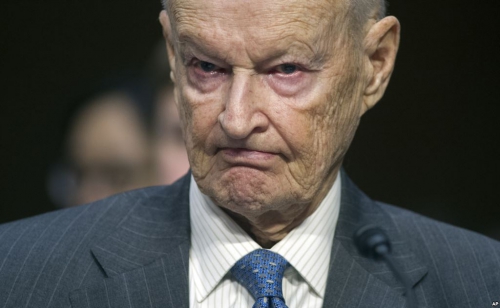Žižek’s thoughts on the refugee crisis are useless, even harmful, for creating a pan-European leftist movement capable of challenging the far-right.
In a recent article Žižek replied to the critique of a previous text he wrote on the so-called ‘refugee crisis.’ The exchange between Žižek and his critics essentially revolved around whether the left should support the refugees and migrants’ demands for open borders and the right to live where they choose, or not.
Žižek claimed that the refugees’ dream, represented by “Norway,” doesn’t exist, whereas one critic points out that it is our duty to create it. Particularly problematic is his use of phrases like “our way of life,” “Western values” and figures like “the typical left-liberal.” The most important thing that is missing in Žižek’s text is an analysis of the potentiality of the refugees and migrants’ struggles.
In his response to the criticism, Žižek begins by complaining about the shift from what he calls “radical emancipatory movements” like Syriza and Podemos to “the ‘humanitarian’ topic of the refugees.” This, we are informed, is not a good thing because the refugee and migrant struggles are actually nothing but “the liberal-cultural topic of tolerance” replacing the more genuine “class struggle.”
Why this is the case is left unclear. Rather, we are told that:
[t]he more Western Europe will be open to [immigrants], the more it will be made to feel guilty that it did not accept even more of them. There will never be enough of them. And with those who are here, the more tolerance one displays towards their way of life, the more one will be made guilty for not practicing enough tolerance.
There are several problems in this statement, especially the idea of a “we” of “Western Europe” contrasted against an image of a “way of life” somehow shared by all refugees and migrants. Before turning to that problem, however, it is useful to examine one of Žižek’s favorite tropes — the “typical left-liberal” — which sits at the heart of his critique.
Žižek’s “typical left-liberal” — a figure that is reiterated and criticized throughout much of his writing — is a figure who holds tolerant and multicultural views, but whose antiracism is actually a kind of subtle racism. In the piece in question the “left-liberal” humanist figure is a person who is afraid of criticizing Islam and who (according to Žižek) unjustly accuses those who do so of being Islamophobic.
But who is this “left-liberal” Žižek has spent so much time criticizing? On closer inspection this figure does not actually represent any position on the left. The left does not face a problem of too much tolerance, this is a straw man. If anything, it faces the twin problems of nationalism (or a national imaginary) and an inability to adequately critique Western values — problems which Žižek’s text demonstrate.
Žižek’s critique therefore completely misses the heart of the discussion: how to thoughtfully criticize fundamentalist religious views as well as “the West” and “Western values.” Žižek does neither of these.
Žižek places this misrepresented figure of the “left-liberal” on the one side, while countering in with an even more problematic and essentially racist stereotyped figure of the refugee/migrant:
Many of the refugees want to have a cake and eat it: They basically expect the best of the Western welfare-state while retaining their specific way of life, though in some of its key features their way of life is incompatible with the ideological foundations of the Western welfare-state.
Now, compare this to a recent statement made by Marine Le Pen, the leader of the French Front National:
“Without a policy restricting immigration, it becomes difficult, if not impossible, to fight against communalism and the rise of ways of life at odds with … values of the French Republic.”
Žižek’s sentiments are remarkably similar to the rhetoric of the European far-right. Representatives of Front National, the Danish Peoples Party or UKIP couldn’t have been more precise on the fundamental views of nationalism within Europe today. Žižek completely capitulates to this nationalism, showing the dangers of utilizing the language of your enemy.
Essentially, Žižek accepts the dominant idea — shared by institutional Europe and the extreme right — that refugees and migrants pose a problem, threat, or some kind of crisis for “us” and “our egalitarianism and personal freedoms.” In doing so he reiterates a common nationalist argument, which can be found both in an institutional form promoted by national governments and in a radical right form: they and their way of life are incompatible with “us” and “our way of life.”
The problem here is not the degree of tolerance or exclusion as Žižek suggests, but rather the opposition itself, which is intrinsically false. In his critique of the (mis)figure of the humanist “left-liberal,” Žižek falls back on the illusion of a totalizing European or Western “we.” A “we” that is superior to the “way of life” of refugees and migrants, because “our” values are universal.
Naturally, this poses a problem, or rather a “refugee crisis” that “we” need to solve. Instead of criticizing this “we,” Žižek reproduces the mainstream media’s image of refugees as a kind of impersonal stream of humans posing nothing but a problem or even a crisis. This, Žižek says, calls for “militarization,” a topic he (fortunately?) doesn’t elaborate on any further.
In the text, all refugees and migrants are defined by the same way of life. However — in risk of stating the obvious — the refugees and migrants come from very different geographical areas and very different cultures. The homogeneity suggested by Žižek clearly draws on an old orientalist trope, where different non-homogenous cultures are categorized within the one culture with opposite and conflicting values to Europe and the West. Gone are not only different cultures, traditions etc., but also variations within these, as well as the myriad forms of secular, liberal, and socialist traditions that have also existed in parts of the vast geographical area that Žižek simply subsumes under a single way of life, sure to create a “crisis” when coming to Europe.
The European figure of the “we” that must solve the “crisis” created by the refugees is of course problematic, but even more problematic is Žižek’s proposed solution to this supposed crisis.
His proposed starting point of action is not, for example, a movement that brings together both migrants and different sectors of European proletarians like precarious workers, the unemployed, students etc., but rather the European nation-states and their political elites.
Rather than fighting together for freedom of movement for all, Žižek thinks the national and supranational elites should curb this right. Rather than fighting for open borders and against the nation-states and their political elites, he supports a centralized distribution of refugees by the nation-states. Rather than analyzing the current conjuncture and the possibilities for contesting the institutions of European political and economic elites — Fortress Europe — Žižek falls back on the same institutional solutions and becomes the “left defender” of Fortress Europe.
Moreover, instead of situating the struggles of refugees and migrants within an analysis of capitalism, Žižek refers abstractly to the problems caused by “the integration of local agriculture into global economy.” Žižek’s avoidance of political economy is not new, but it becomes particularly problematic in this case because it’s not coupled with an analysis of the current social struggles throughout Europe and beyond, resulting in a strange opposition between abstract “class struggle” and the struggles of refugees and migrants.
There is no serious attempt to analyze the potentialities of these struggles and how their articulation to other social struggles could potentially challenge the extreme right.
Rather than try to answer such questions, Žižek suggests that the “left must embrace its radical Western roots.” Unfortunately, Žižek uncritically adopts the concept of “Western values” which seem to imply “universal values.”
But what are “western values” and the European cultural heritage if not a deeply bourgeois heritage? A heritage with a history full of mass killings, mass extermination, war, colonialism, and imperialism etc.? This history of western values is not just the past but also the present. The so-called war on terror has cost 1.3 million civilian lives.
It is not refugees and migrants who have created any crisis. Instead, it is Europe, the West and global capital with its self-claimed universal values that pose a fundamental threat to humanity in general. What are western values if not “freedom, equality, property, and Bentham,” as Marx once said?
Žižek criticizes the left for wanting to “fill in the gap of the missing radical proletarians by importing them from abroad, so that we will get the revolution by means of an imported revolutionary agent.” Like the figure of the “left-liberal,” this notion seems to be pulled out of thin air.
It would be far more interesting if Žižek actually participated in the discussion on how to connect migrant and refugee struggles with other kinds of struggles. Instead we get a critique of these unsubstantiated figures of positions on the left. Who is Žižek actually criticizing?
In the last couple of months, we have witnessed how migrant and refugee struggles in Calais, Greece, Hungary, Slovenia, Germany, and even Denmark have sparked a new antiracist movement that could potentially challenge the growing extreme right. This is a movement that overcomes the national “we” and contains networks of solidarity between different sectors of migrants, refugees, and the European population.
How these struggles can be combined with other kinds of struggles is of crucial importance. Yet Žižek manages to reduce this potentiality to “the liberal-cultural topic of tolerance.” Žižek’s last two texts are completely useless for creating an anti-capitalist and anti-national movement across Europe capable of challenging the radical right and European elites; indeed, they have been harmful for such a project.
Esben Bøgh Sørensen is an intellectual historian from Denmark with a Master’s degree in History of Ideas. He has been engaged in various social movements, most recently the student movement and the refugee solidarity movement. You can find his writings on academia.edu.





 del.icio.us
del.icio.us
 Digg
Digg

